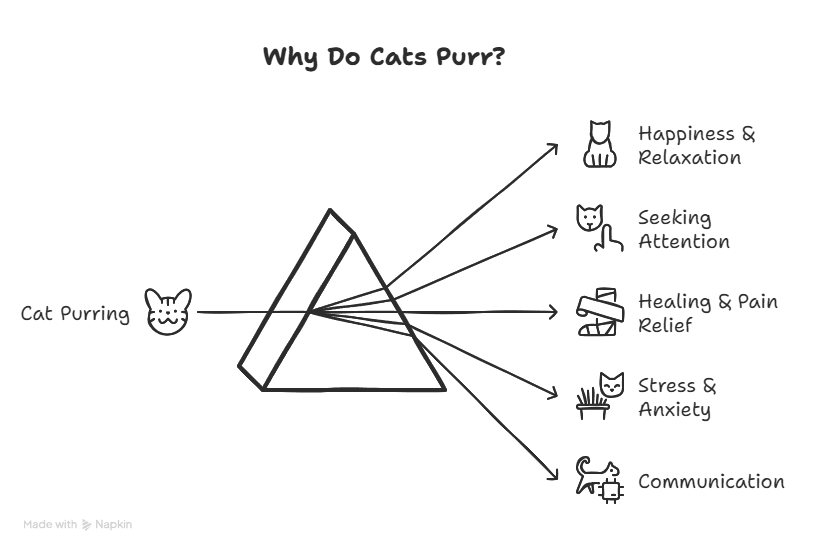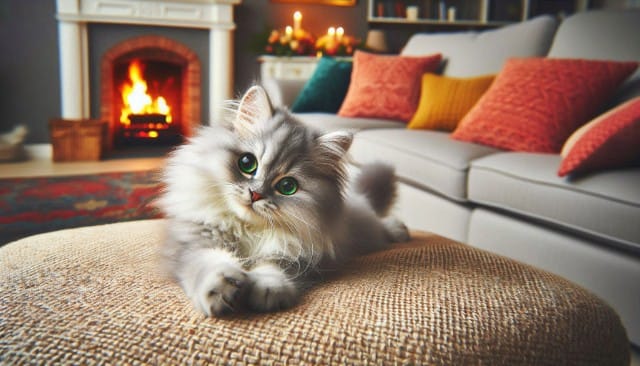
If you’ve ever had a cat curl up on your lap, purring away like a tiny motor, you’ve probably wondered: Why do cats purr?
Most people assume it means a cat is happy—and while that’s often true, there’s a lot more to purring than just contentment. Cats purr for all sorts of reasons, from self-healing to communication. In fact, some studies suggest that purring could even help humans feel calmer and heal faster!
Let’s dive into the fascinating science behind cat purring, why cats do it, and what it might mean when your furry friend starts vibrating.
How Do Cats Purr? The Science Behind It
Purring is one of those weird and wonderful things that make cats so unique. But have you ever wondered how they do it?
Unlike meowing, which involves the vocal cords, purring happens deep in a cat’s throat. Here’s how it works:
- A cat’s brain sends signals to the muscles in their larynx (voice box).
- These muscles rapidly contract and relax—about 25-150 times per second!
- As the cat breathes in and out, the vibrations create the gentle rumbling sound we all know and love.
Unlike most vocal sounds, which only happen on either an inhale or an exhale, purring happens on both, allowing a cat to purr continuously.
Pretty cool, right?
Why Do Cats Purr? The Many Reasons Behind It
While purring is usually associated with happiness, cats actually purr in a variety of situations. Here are the most common reasons your cat might be purring:

1. They’re Feeling Happy & Relaxed 😻
This is the reason most people think of first—and for good reason!
If your cat purrs while snuggling with you, getting chin scratches, or drifting off to sleep, they’re probably just really happy and comfortable.
🐾 How to tell if it’s a happy purr: Look for other signs like kneading, slow blinking, and a relaxed body.
2. They Want Attention (or Food!) 🍗
Ever noticed that your cat purrs extra loudly when it’s mealtime? That’s no accident.
Some cats develop a special “solicitation purr”, which mixes a normal purr with a high-pitched sound that resembles a baby’s cry—something humans are naturally wired to respond to.
🐾 Translation: “Hey human, pay attention to me! And maybe grab the treats while you’re at it?”
3. Purring Helps Cats Heal & Reduce Pain 🏥
Here’s where things get really interesting: scientists believe purring has actual healing properties for cats.
Research shows that the vibrations from a cat’s purr (between 25-150 Hz) can help stimulate healing, reduce pain, and even strengthen bones.
That might explain why cats often purr when they’re injured, sick, or recovering from surgery—it’s their built-in self-healing mechanism!
🐾 Fun fact: Some scientists even think human exposure to cat purring might help with stress, pain relief, and healing fractures.
4. They’re Stressed or Anxious 😿
It might seem surprising, but cats also purr when they’re scared or stressed.
For example, some cats purr at the vet’s office, during a car ride, or in new environments. It’s their way of self-soothing, almost like how some people hum or fidget when nervous.
🐾 How to tell if it’s a stress purr: Look for signs like wide eyes, flattened ears, or a tucked tail.
5. Mother Cats & Kittens Use Purring to Communicate 🍼
Kittens start purring when they’re just a few days old. Since newborn kittens are born blind and deaf, they use purring to signal their mom that they’re nearby and need milk.
Mama cats also purr to comfort their kittens, reinforcing a sense of security and warmth.
🐾 Fun fact: Many adult cats continue this behavior by purring when they snuggle with their favorite humans.
Can Purring Benefit Humans Too?
Turns out, cat purring isn’t just good for cats—it’s great for humans too!
1. Purring Can Reduce Stress & Anxiety 🧘♂️
Ever noticed how listening to a cat purr makes you feel instantly calmer? Studies suggest that cat owners tend to have lower blood pressure and reduced stress levels, thanks to the relaxing effects of purring.
🐾 Translation: “I’m basically a tiny, fluffy therapist!”
2. It Might Even Help with Pain Relief 🤕
Since purring helps cats heal, some scientists believe that the same frequencies could benefit humans. Some studies suggest that the vibrations from purring might help reduce joint pain, promote bone healing, and ease muscle tension.
🐾 Fun fact: Therapy cats are sometimes used in hospitals and nursing homes to provide comfort and aid in recovery.
What If Your Cat Doesn’t Purr?
Not all cats are big purrers, and that’s completely normal. Some reasons why a cat might not purr much:
✔️ Personality differences—Some cats just don’t purr often!
✔️ Breed variations—Certain breeds, like Siamese cats, tend to be quieter.
✔️ Different ways of expressing affection—Some cats show love through slow blinks, rubbing against you, or cuddling instead.
🐾 Bottom line: If your cat seems happy and healthy, don’t worry if they’re not a big purrer.
FAQs About Cat Purring
Q: Can cats control when they purr?
Yes and no. While cats purr automatically in response to emotions and physical states, they can also purr intentionally to communicate with humans.
Q: Do big cats like lions and tigers purr?
Not in the same way! Big cats like lions can’t purr continuously like house cats—instead, they can only purr when exhaling.
Q: Why does my cat purr and then suddenly bite me?
This is often called “overstimulation aggression.” Some cats get too excited or sensitive from petting, so they purr at first but then bite when they’ve had enough.
🐾 Tip: Watch for signs like tail flicking, twitching skin, or flattened ears—these are warnings that your cat needs a break!
Also Read - Why Does My Cat Sleep on Me? Reasons & Meanings
Final Thoughts
Cats purr for so many reasons, from happiness and communication to self-healing and stress relief.
🐾 They purr when they’re content—but also when they’re scared or in pain.
🐾 Purring can help cats heal, and it might even benefit humans!
🐾 Some cats don’t purr much, and that’s totally normal.
So next time your cat snuggles up and starts purring, enjoy the moment—it’s one of the best sounds in the world!
💬 Does your cat purr a lot? Or do they only purr in certain situations? Share your experiences in the comments below! 🐱👇




